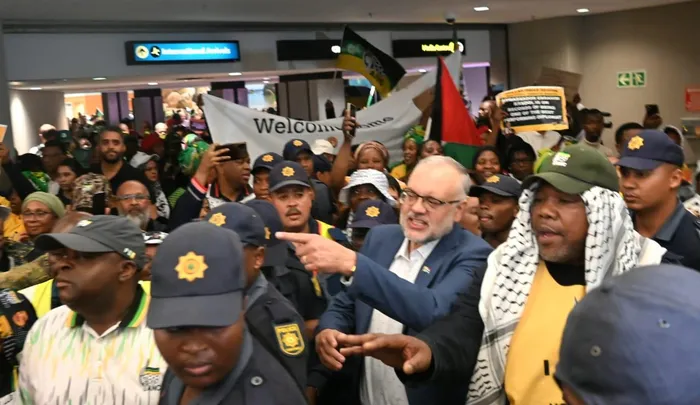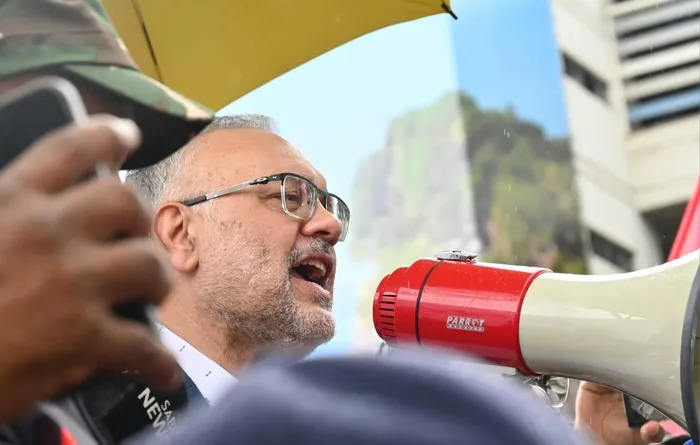
Former ambassador to the United States of America (U.S), Ebrahim Rasool, was welcomed with song and dance at Cape Town International Airport on Sunday.
Image: Ayanda Ndamane/Independent Newspapers
“It was not our choice to come home, but we come home with no regrets.”
This was how former ambassador to the United States of America (U.S.), Ebrahim Rasool, started his address to the media after he was welcomed with song and dance at Cape Town International Airport on Sunday.
Many Capetonians came out to show support for Rasool and his wife, Rosieda, as they returned to the country after a long journey from the U.S.
Rasool made headlines after he was expelled from the US for remarks made during a webinar held by the Mapungubwe Institute for Strategic Reflection (Mistra). The theme was 'Implications of changes in US administrations for SA and Africa'.
During the webinar, Rasool said people should get hold of the framework document of South Africa’s national interests — because this is going to be a guide for SA during these very turbulent moments that we are navigating between our values and our interests.
Rasool previously served as SA ambassador to the U.S. during the Barack Obama administration between 2010 and 2015. He was re-appointed in January 2025, as ambassador during the Joe Biden and then Donald Trump administration.
Rasool explained that his remarks were to South African intelligentsia, intellectuals, political leaders and others to alert them to a change of tradition in the United States, and that the old way of doing business with the US was not going to work.
“It is not the U.S. of Obama, it is not the U.S. of Clinton, it is a different U.S. and therefore our language must change. Not only to transactionality but also a language that can penetrate a group that has clearly identified a fringe white community in South Africa as their constituency surrounded by a white diaspora in the White House.
“That is what we are up against… and so there is nothing I will say there that I would not say elsewhere, so I would stand by my analysis because we were analysing a political phenomenon, not a personality, not a nation and not even a government, so I stand by that,” Rasool said.
Despite the friction caused by his removal and the difference in stances on certain issues, Rasool remained resolute in the idea that South Africa should continue efforts to rescue the relationship with the United States.
“We must reset the relationship with America because our relationship with America (has been) over 50 years has not always been with the White House. It has sometimes been with Congress and it has always been with the people of the United States of America.
“We have this relationship that we must reset, and we must rebuild. We must hope that President Cyril Ramaphosa will be able to pick up where we left off, but we cannot have a simplistic idea that when we say there must be an ambassador, that you must put a white ambassador for a white president in the United States. We know it's not right.”

Former ambassador to the United States of America (U.S), Ebrahim Rasool, addressed the media and public after he was welcomed with song and dance at Cape Town International Airport on Sunday.
Image: Ayanda Ndamane/Independent Newspaper
Rasool explained that they tried the conventional diplomacy route with the US but that they have had to rely on the diplomacy of Ubuntu.
“The diplomacy of mutual inter-dependence that I am because you are. The diplomacy of Ubuntu is not the art of lying for your country. It is the art of speaking the truth, but gently. The diplomacy of Ubuntu is not flattering your host, and the diplomacy of Ubuntu is not denying what is wrong. The diplomacy of Ubuntu is intellectual engagement, and it is persuasion of your host about a better way… And that's what I thought was the way forward in this very difficult and challenging situation of our relationship with the United States,” Rasool said.
When asked about attempts made to make contact with the White House, Rasool explained part of the design of the ‘persona non-grata’ (label) was to make sure that the “access we got would not be used, because there is a different agenda that wants to prioritise white suffering over black needs in South Africa”.
When asked what comes next, and what role he will next play, he said, “It is too early to make decisions of that nature.
“You must first recover from your previous job before you look for another job. We will think about it, we will pray on it, we will consult on it and then we will decide what to do next.”
He explained that a report on the matter will be delivered to the president, but didn’t specify on a timeline of when it would be submitted.
“We have started to write that report last week, we will finalise it, and we will be ready for the president with that report.”
theolin.tembo@inl.co.za